Related Research Articles
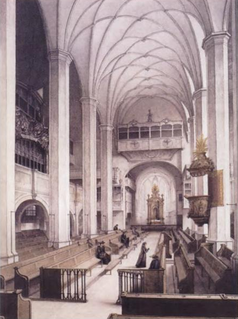
Johann Sebastian Bach composed the church cantata Gott soll allein mein Herze haben, BWV 169, a solo cantata for an alto soloist, in Leipzig for the 18th Sunday after Trinity, and first performed it on 20 October 1726.
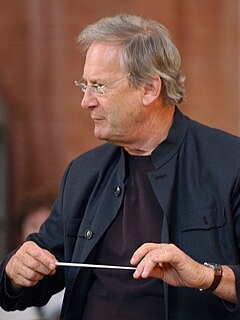
Sir John Eliot Gardiner is an English conductor, particularly known for his performances of the works of Johann Sebastian Bach.
The Monteverdi Choir was founded in 1964 by Sir John Eliot Gardiner for a performance of the Vespro della Beata Vergine in King's College Chapel, Cambridge. A specialist Baroque ensemble, the Choir has become famous for its stylistic conviction and extensive repertoire, encompassing music from the Renaissance period to Classical music of the 20th century. They often appear with John Eliot Gardiner's orchestras, the English Baroque Soloists and Orchestre Révolutionnaire et Romantique.
Daniel John Taylor is a Canadian countertenor and early music specialist. Taylor runs the Theatre of Early Music and teaches at the University of Toronto.
Robin Blaze is an English countertenor.

Charles Daniels is an English tenor, particularly noted for his performances of baroque music. He is a frequent soloist with The King's Consort, and has made over 25 recordings with the ensemble on the Hyperion label.
Matthew White is a Canadian countertenor.
Caroline Stam is a Dutch classical soprano who has an international (European) performing career specializing in baroque repertoire, reinforced by a distinguished presence in modern recordings.

Johann Sebastian Bach composed the church cantata Herr, deine Augen sehen nach dem Glauben, BWV 102 in Leipzig for the tenth Sunday after Trinity and it was first performed on 25 August 1726.

Johann Sebastian Bach composed the church cantata Lobe den Herrn, meine Seele, BWV 69a, also BWV 69.1, in Leipzig for the twelfth Sunday after Trinity and first performed it on 15 August 1723. It is part of his first cantata cycle.

Johann Sebastian Bach composed the church cantata Warum betrübst du dich, mein Herz, BWV 138, in Leipzig for the 15th Sunday after Trinity and first performed it on 5 September 1723. The text by an unknown author includes three stanzas from the hymn of the same name. Its text and melody were formerly attributed to Hans Sachs, but were written by an unknown hymn writer. The cantata has seven movements and is scored for SATB soloists and choir, two oboes d'amore, two violins, viola and basso continuo. The cantata has features of a chorale cantata although it was written a year before Bach's annual cycle of chorale cantatas. Bach used an aria as the base of the Gratias of his Missa in G major.

Johann Sebastian Bach composed the church cantata Bringet dem Herrn Ehre seines Namens, BWV 148, probably in 1723 in Leipzig for the 17th Sunday after Trinity.
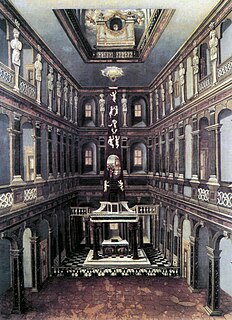
Johann Sebastian Bach composed the church cantata Ach! ich sehe, itzt, da ich zur Hochzeit gehe, BWV 162, in Weimar for the 20th Sunday after Trinity and first performed it in 1715 or 1716.
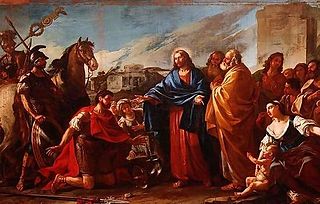
Johann Sebastian Bach composed the church cantata Ich glaube, lieber Herr, hilf meinem Unglauben, BWV 109, in Leipzig for the 21st Sunday after Trinity and first performed it on 17 October 1723.
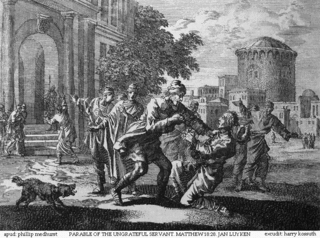
Johann Sebastian Bach composed the church cantata Mache dich, mein Geist, bereit, BWV 115, in Leipzig for the 22nd Sunday after Trinity and first performed it on 5 November 1724. The chorale cantata is based on the hymn by Johann Burchard Freystein (1695).

Johann Sebastian Bach composed the church cantata Wohl dem, der sich auf seinen Gott, BWV 139, in Leipzig for the 23rd Sunday after Trinity and first performed it on 12 November 1724. The chorale cantata is based on the hymn by Johann Christoph Rube (1692).
Lobe den Herrn, meine Seele, BWV 143, is an early cantata by Johann Sebastian Bach. He appears to have composed the cantata for New Year's Day, probably when he was in his 20s, but whether it was first performed in Mühlhausen or Weimar is not known: the date of composition is unclear. Bach's authorship has been doubted because the cantata has several ununusual features; one of these is the scoring, it is the only Bach cantata to combine three corni da caccia with timpani.

Nur jedem das Seine, BWV 163, is a church cantata by Johann Sebastian Bach. He composed the work in Weimar for the twenty-third Sunday after Trinity and first performed it on 24 November 1715.
Wilke te Brummelstroete is a Dutch mezzo-soprano. She has recorded Bach cantatas with John Eliot Gardiner and appeared as the valkyrie Siegrune in Wagner's Die Walküre at the Bayreuth Festival.
References
- ↑ "Rachel Podger to Lead Early-Music Ensemble". The Juilliard School. 20 February 2015. Retrieved 15 February 2022.
- 1 2 3 "Julian Podger (tenor)". Hyperion . Retrieved 23 February 2018.
- ↑ "Julian Podger". BBC . Retrieved 23 February 2018.
- ↑ "Julian Podger (Tenor, Choral Conductor)". Bach Cantatas Website. Retrieved 23 February 2018.
- ↑ Hugill, Robert. "George Frideric Handel (1685–1759) / Jephtha". musicweb-international.com. Retrieved 2 March 2018.
- ↑ "Music for the Peace of Utrecht". Gramophone . Retrieved 23 February 2018.
- ↑ Ashley, Tim (8 July 2010). "Handel; Croft: Music for the Peace of Utrecht". The Guardian . Retrieved 23 February 2018.
- ↑ "Music for the Peace of Utrecht". Nederlandse Bachvereniging . Retrieved 23 February 2018.